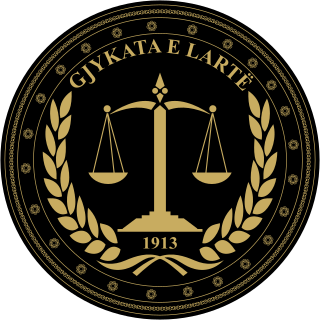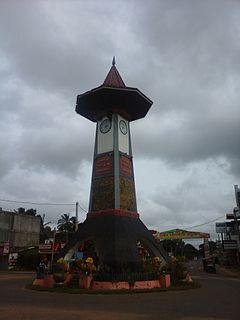
The International Court of Justice (ICJ) sometimes called the World Court, is the principal judicial organ of the United Nations (U.N.). Its two functions are to settle international legal disputes submitted by the states involved and give advisory opinions on legal issues referred to it by the U.N.. Through its opinions and rulings, the ICJ serves as a source of international law.
Jurisdiction is the practical authority granted to a legal body to administer justice within a defined field of responsibility, e.g., Michigan tax law. In federations like the United States, areas of jurisdiction apply to local, state, and federal levels; e.g. the court has jurisdiction to apply federal law.

In the United States, a state court has jurisdiction over disputes with some connection to a U.S. state. State courts handle the vast majority of civil and criminal cases in the United States; the much smaller in case load and personnel, United States federal courts, handle different types of cases.
The judiciary is the system of courts that interprets and applies the law in a country, or an international community. The first legal systems of the world were set up to prevent citizens to settle conflicts with violence.

A court is any person or institution with authority to judge or adjudicate, often as a government institution, with the authority to adjudicate legal disputes between parties and carry out the administration of justice in civil, criminal, and administrative matters in accordance with the rule of law. In both common law and civil law legal systems, courts are the central means for dispute resolution, and it is generally understood that all people have an ability to bring their claims before a court. Similarly, the rights of those accused of a crime include the right to present a defense before a court.

A county court is a court based in or with a jurisdiction covering one or more counties, which are administrative divisions within a country, not to be confused with the medieval system of county courts held by the high sheriff of each county.

The United States Senate Committee on the Judiciary, informally the Senate Judiciary Committee, is a standing committee of 22 U.S. Senators whose role is to oversee the Department of Justice (DOJ), consider executive nominations, and review pending legislation.

The Judiciary Act of 1789 was a United States federal statute adopted on September 24, 1789, in the first session of the First United States Congress. It established the federal judiciary of the United States. Article III, Section 1 of the Constitution prescribed that the "judicial power of the United States, shall be vested in one supreme Court, and such inferior Courts" as Congress saw fit to establish. It made no provision for the composition or procedures of any of the courts, leaving this to Congress to decide.

The Hawaii State Circuit Courts are the trial courts of general jurisdiction in Hawaii. They are the primary civil and criminal courts of the Hawaii State Judiciary. The Circuit Courts are the only Hawaii state courts to conduct jury trials..

The federal judiciary of the United States is one of the three branches of the federal government of the United States organized under the United States Constitution and laws of the federal government. Article III of the Constitution requires the establishment of a Supreme Court and permits the Congress to create other federal courts, and place limitations on their jurisdiction. Article III federal judges are appointed by the President with the consent of the Senate to serve until they resign, are impeached and convicted, retire, or die.
Judicial review is a process under which executive or legislative actions are subject to review by the judiciary. A court with authority for judicial review may invalidate laws acts and governmental actions that are incompatible with a higher authority: an executive decision may be invalidated for being unlawful or a statute may be invalidated for violating the terms of a constitution. Judicial review is one of the checks and balances in the separation of powers: the power of the judiciary to supervise the legislative and executive branches when the latter exceed their authority. The doctrine varies between jurisdictions, so the procedure and scope of judicial review may differ between and within countries.
The Ohio Courts of Common Pleas are the trial courts of the state court system of Ohio.

The High Court of Justice in England is, together with the Court of Appeal and the Crown Court, one of the Senior Courts of England and Wales. Its name is abbreviated as EWHC for legal citation purposes.

The Supreme Court of the Republic of Albania is the highest court of Albania and is the final court of appeal in the judicial system of Albania. It is composed of seventeen judges, the Chief Justice and sixteen Members.
The Judiciary of Sri Lanka are the civil and criminal courts responsible for the administration of justice in Sri Lanka. The Constitution of Sri Lanka defines courts as independent institutions within the traditional framework of checks and balances. They apply Sri Lankan Law which is an amalgam of English common law, Roman-Dutch civil law and Customary Law; and are established under the Judicature Act No 02 of 1978 of the Parliament of Sri Lanka.
The Judiciary of Michigan is defined under the Michigan Constitution, law, and regulations as part of the Government of Michigan. The court system consists of the Michigan Supreme Court, the Michigan Court of Appeals as the intermediate appellate court, the circuit courts and district courts as the two primary trial courts, and several administrative courts and specialized courts. The Supreme Court administers all the courts. The Michigan Supreme Court consists of seven members who are elected on non-partisan ballots for staggered eight-year terms, while state appellate court judges are elected to terms of six years and vacancies are filled by an appointment by the governor, and circuit court and district court judges are elected to terms of six years.
The High Court in Sri Lanka is the only court which exercises the jurisdiction of the court of first instance and the appellate jurisdiction with both civil and criminal jurisdiction.
The Judiciary of Albania interprets and applies the law of Albania. Albania's judicial system is a civil law system divided between courts with regular civil and criminal jurisdiction and administrative courts. Albanian law is codified and based on the French law. It is governed by the High Council of Justice (Këshilli i Lartë i Drejtësisë), and its management is aided by the office of the President of Albania, the Ministry of Justice, and the various courts chairpersons.
The Magistrate's Courts in Sri Lanka is a lower court headed by a Magistrate who is vested with original criminal jurisdiction.











